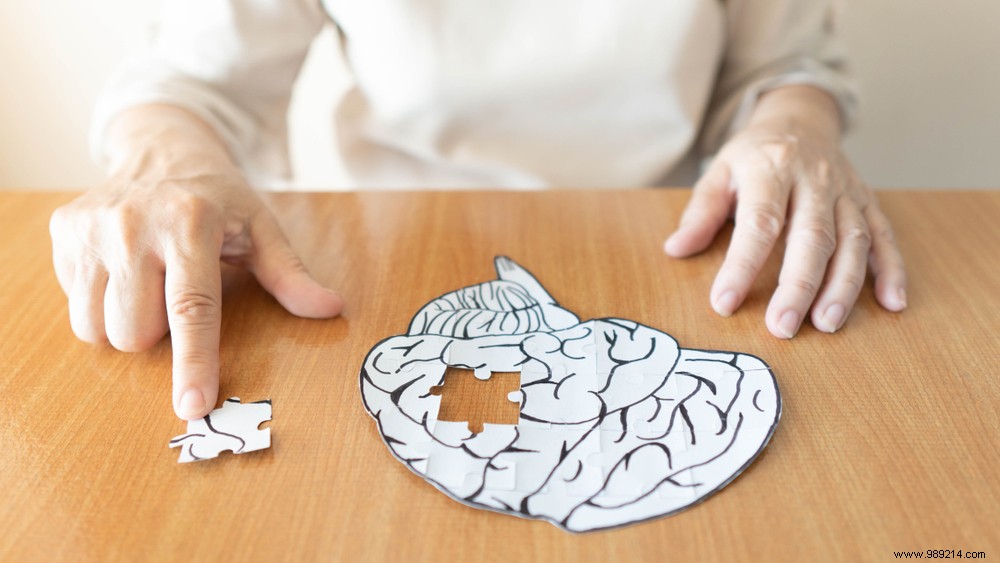
Forgetting your keys, where you put your glasses or even the name of this well-known actor who we adore, it happens to all of us. When these forgetfulness become daily or worsen, they may be a sign of the onset of Alzheimer's disease. How to recognize this pathology in you or someone close to you? Here are the signs that should alert you.
Alzheimer's disease, what is it exactly?
Discovered in 1906 by the German neurologist Alois Alzheimer, this disease affects the nervous system and is characterized by a progressive deterioration of memory and cognitive functions. Alzheimer mainly affects the elderly, naturally affected by a decline in cognitive faculties due to their age, but the disease can also affect young people, barely 40 years old.
Due to advances in medicine, life expectancy is constantly being pushed back, which creates a favorable ground for the spread of the disease. In 2015, there were 900,000[1] patients in France and 225,000 new cases are added each year. It is a disease that affects women in particular, two out of three cases. People with this disease have significant costs to bear. On average, it is estimated that you have to spend about €1,000 per month to treat a patient properly.
What are the warning signs?
When the disease begins to set in, it can be difficult to tell the difference between a simple temporary forgetfulness and the onset of dementia. Here are the symptoms to watch out for especially in you and especially in your loved ones:
Physical Signs
Cognitive signs
Affective signs
How are patients diagnosed?
The key in Alzheimer's disease is time. Indeed, this degenerative disease can progress very quickly, and the best way to limit the damage is rapid treatment. For this, it is essential to make a diagnosis as soon as possible. It is estimated that on average one patient in two[2] is unaware that he or she has Alzheimer's disease and will only know about it at a very advanced stage.
If in doubt, consult your GP. This is the first step. If necessary, he can prescribe additional tests or refer you to a specialist. He may also recommend that you go see a neurologist, psychiatrist or geriatrician, professionals who are better able to give you small neurological and psychological tests that can help with the diagnosis. If necessary, a neuropsychological assessment will be carried out by a neuropsychologist. It consists of more extensive tests and examinations that can last up to two hours. These can be supplemented by the passage of an MRI or CT scan to check the state of the brain.
Establishing a sure and reliable diagnosis for Alzheimer's disease is long and tedious. It is necessary to make sure that it is indeed this pathology in order to be able to offer an appropriate treatment. If you have the slightest doubt, do not delay in consulting for yourself or for the loved one concerned.
The village of hope in the Landes
To help patients live as normal a life as possible while being perfectly supervised, an Alzheimer's village has been created in the Landes. There are 16 households of 300 m2 that can accommodate up to 120 boarders.
What treatments are offered for Alzheimer's?
Currently, there is no treatment to cure Alzheimer's disease or slow its progression. However, there are treatments available that will address the symptoms in order to make life easier for patients and their families. There are two main types:drug treatments and therapies.
To protect yourself and your loved ones, trust the Wellness mutual and its guarantees in the event of loss of autonomy.
Very widespread, Alzheimer's disease can affect anyone. Difficult to diagnose, it can progress very quickly and must therefore be identified as soon as possible. Carefully monitor your condition and that of your loved ones to recognize the symptoms.
Source:
https://alzheimer-recherche.org/la- Maladie-alzheimer/quest- Maladie-dalzheimer/definition-et-chiffres/#:~:text=Aujourd'hui%2C%20la%20 Maladie%20d,(malades%20et %20relatives%20caregivers).
https://www.vaincrealzheimer.org/la-malady/diagnosis/
https://www.vaincrealzheimer.org/disease/symptoms/
https://www.vaincrealzheimer.org/la-malady/treatments/
[1] Alzheimer Research Foundation
[2] Overcoming Alzheimer's Foundation